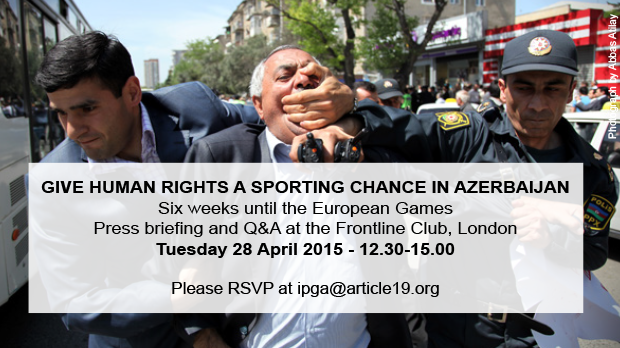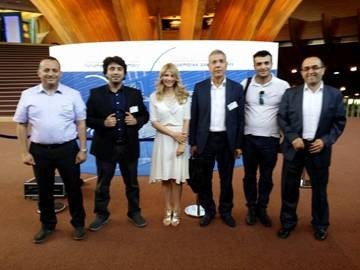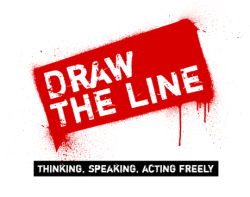9 Apr 2015 | About Index, Azerbaijan Statements, Events, mobile, Press Releases

Download invitation
Should human rights activists call for boycotts of sports events hosted by repressive regimes? What responsibility do sports organisations have? How can journalists effectively cover the full scope of human rights, social and political issues surrounding the Baku European Games?
In June 2015, Azerbaijan’s capital Baku will host the first European Games under the umbrella of the European Olympic Committees. Controversy already surrounds this new sporting venture, following reports earlier this year that Azerbaijan will foot the bill for all 50 national Olympic teams to attend.
The country’s internal political situation gives further cause for concern. Over the last twelve months, a wave of arrests of key critics — including human rights activists, election monitors, lawyers and investigative journalists — has almost entirely silenced Azerbaijani civil society, leaving activists and journalists in exile to highlight the regime’s on-going attacks on freedom of expression. Several large NGOs have been closed and legislative amendments make it almost impossible for critical groups to get foreign funding. The government controls all broadcast media, and in December, it forcefully closed the Baku branch of Radio Free Europe/Radio Liberty, a US-funded media organisation.
Meanwhile, Azerbaijan continues an expensive PR campaign to promote its image abroad – with considerable success. International criticism has been largely muted; with the EU and the US looking at ways to foster closer and strategic ties with Azerbaijan.
During this interactive session, our panellists will explore the relationship between sport and human rights, examining the argument that Azerbaijan is using such high profile events to whitewash its image amidst criticism from domestic human rights activists as well as international bodies regarding its human rights records.
The panel, chaired by ARTICLE 19, will bring together Azerbaijani human rights activists, political commentators and international human rights experts. The panellists will include Emin Milli, a former political prisoner in Azerbaijan, now director of Meydan TV, Rebecca Vincent, coordinator of the Sport for Rights Campaign, Giorgi Gogia, Human Rights Watch’s senior researcher on Azerbaijan who was recently denied entry into the country, and others to be confirmed.
The event format will be as follows:
12.30 – 13.00: Arrival, lunch and informal discussion
13.00 – 14.00: Interactive session, featuring Azerbaijani journalists and activists as well as human rights experts.
14.00 – 15.00: Opportunity for one-on-one interviews/discussion with panel members
The Panellists:
Emin Milli is an activist, blogger and co-founder of Meydan TV, an alternative online Azerbaijani news service, operating from Berlin. In August 2009, Milli and Adnan Hajizada, (known as the “donkey bloggers”), were found guilty of hooliganism and imprisoned for more than a year after posting an online video satirising the Azerbaijani government.
@eminmilli
Rebecca Vincent is a human rights activist and former U.S. diplomat who has been working on Azerbaijan for nine years. In December 2012, her Azerbaijani residence permit was revoked in connection with her human rights work in the country, and she has been unable to return to Azerbaijan ever since. She is currently the coordinator of the Sport for Rights campaign.
@rebecca_vincent
Giorgi Gogia is a senior researcher at Human Rights Watch with over a decade of experience working on Azerbaijan. Giorgi was recently banned from travelling to Azerbaijan, preventing him from monitoring the trials of human rights defenders behind bars on politically-motivated charges. He was deported without any explanation after spending 31 hours in Baku’s Heydar Aliyev airport.
@Giorgi_Gogia
This event is hosted by Article 19, Human Rights Watch and Index on Censorship on behalf of the International Partnership Group for Azerbaijan (IPGA). The IPGA is a coalition of 22 international NGOs, coordinated by ARTICLE 19, working to promote and protect freedom of expression in Azerbaijan. The group arose from a broader International Partnership framework established by International Media Support (IMS) and Open Society Foundations (OSF) in 2010. Since then, the IPGA has engaged in joint advocacy around specific events, such as the Eurovision Song Contest and the Internet Governance Forum both of which were held in the Azerbaijani capital Baku in 2012; and has regularly raised issues relating to human rights in Azerbaijan at international and regional institutions, notably the Council of Europe – with Azerbaijan chairing the body’s Committee of Ministers in 2014. – Read more about the IPGA
Where: Frontline Club, 13 Norfolk Place, London W2 1QJ
When: Tue 28 April, 12:30pm
Tickets: RSVP at [email protected]
14 Jan 2015 | Campaigns, Statements
The arrest of French comedian Dieudonné today appears to be connected to a Facebook comment he posted after Sunday’s march in Paris in which he said he felt he “finally returned home… I feel like Charlie Coulibaly” – remarks that have been interpreted as condoning the action of one of the terrorists involved in the killings of 17 people in Paris last week.
It is important to be clear that while incitement to terrorism is a crime, commentary or jokes about terrorism – no matter how offensive or tasteless – are not. Opinions are protected by the right to freedom of expression.
“You cannot address bigoted and offensive ideas by banning them. To do so simply drives them underground,” said Index CEO Jodie Ginsberg. “The attacks on Charlie Hebdo should be a spur to every one of us to defend ever more vigorously free speech in all forms – even and especially when it represents opinions we find abhorrent or disagree with – so that all views are represented and can be challenged.”
The full text of the Dieudonne remark, later deleted, is as follows: “After this historic march what do I say…Legendary. Instant magic equal to the Big Bang that created the universe. To a lesser extent (more local) comparable to the coronation of Vercingétorix, I finally returned home. You know that tonight as far as I’m concerned I feel like Charlie Coulibaly”.
As Article 19 points out in a statement today, publicly condoning (faire publiquement l’apologie) acts of terrorism is a crime under Article 421-2-5 of the French Criminal Code.
The offence is punishable with up to five years’ imprisonment, and a fine of €75,000. Harsher penalties for the offence are available when it is committed online, allowing up to seven years’ imprisonment and a fine of €100,000.
“International standards are clear that terrorism offences should not be so broad or vague as to encompass expression where there is no actual intent to encourage or incite terrorist acts,” Article 19 said. “To impose criminal sanctions, there must be a direct and immediate connection between the expression at issue, and the likelihood or occurrence of such violence.”
16 Oct 2014 | Azerbaijan, Azerbaijan Statements, Campaigns, Statements

The Azerbaijani authorities should immediately lift the travel ban imposed on Khadija Ismayilova and cease all legal proceedings against her. Against the backdrop of the unprecedented crackdown on civil society, Khadija Ismayilova’s arrest on criminal defamation charges seems imminent and would confirm the authorities’ intent to silence all critical voices in the country.
As part of the International Partnership Group on Azerbaijan (IPGA), APC, ARTICLE 19, the Committee to Protect Journalists, Index on Censorship, the European Federation of Journalists, Freedom House, Freedom Now, the Human Rights House Foundation, International Media Support, the Media Diversity Institute, PEN International and Reporters without Borders, call on the international community, and in particular Council of Europe member states to immediately and publicly condemn the ongoing harassment and politically motivated criminal charges against Khadija Ismayilova. With the next court hearing taking place on Friday 17 October, at 11.30 in Binagadi district court in Baku, Council of Europe member states should publicly request to attend and send a representative to monitor the hearing.
IPGA members believe that Khadija Ismayilova’s attendance at the most recent session of the Parliamentary Assembly of the Council of Europe (PACE) in Strasbourg triggered the latest string of harassment, including a five hour search upon arrival at the airport following her trip, the criminal defamation charges and the imposition of a travel ban.
“Those who raise concern about the existence of political prisoners in Azerbaijan at the Council of Europe are themselves specifically targeted by the authorities, and such reprisals are incompatible with international human rights standards the Azerbaijani authorities claim to adhere to,” said David Diaz-Jogeix, Director of Programmes of ARTICLE 19.
“The ongoing harassment of one of Azerbaijan’s most outspoken critics follows an unprecedented wave of arrests of human rights defenders, civic activists and journalists in Azerbaijan who have dared to publicly criticise the authorities. Those who have spoken about the issue of political prisoners in Azerbaijan at PACE have been particularly targeted.” said Florian Irminger, Head of Advocacy and Geneva Office at the Human Rights House Foundation (HRHF).
“We are deeply concerned by the increasing persecution of human rights defenders in Azerbaijan and, in particular, continued attempts to stifle free expression through intimidation and harassment of journalists like Khadija Ismayilova and Arzu Geybulla. The international community – and especially the Council of Europe of which Azerbaijan is part – needs to speak out loudly and firmly against the crackdown in Azerbaijan,” stated Jodie Ginsberg, CEO of Index on Censorship.
“Khadija Ismayilova is one of the most recognized investigation journalists in Azerbaijan. Harassing her is sending a clear signal of intimidation to the entire media profession,” Reporters Without Borders deputy programme director Virginie Dangles said.

These six human rights defenders, pictured above from left to right here are:
Zohrab Ismayil: forced to leave Azerbaijan, his NGO, Public Association for Assistance to Free Economy, paralysed
Emin Huseynov: unable to work in Azerbaijan, due to legal action against his NGO, Institute for Reporters Freedom of Safety, subject to travel ban
Gulnara Akhundova: forced to leave Azerbaijan, no longer able to represent her NGO, International Media Support from within the country
Rasul Jafarov: in pre-trial detention on politically motivated charges
Intigam Aliyev: in pre-trial detention on politically motivated charges, unable to take his cases at the European Court for Human Rights forward
Rashid Hajili: forced to stop working as human rights defender, his NGO, Media Rights Institute seized operating
The IPGA calls on the Azerbaijani authorities to cease its harassment of Khadija Ismayilova and stop the silencing of its critics through imprisonment and politically motivated legal actions. Member states of the Council of Europe, the main human rights institution in Europe, need to speak up and hold Azerbaijan to account for failing to implement its human rights obligations. With Azerbaijan as chair of its Committee of Ministers until 14 November, the integrity and accountability of the institution is at stake.
For further information about Khadija Ismayilova, also see the recent IPGA report Azerbaijan – when the truth becomes a lie.
16 Oct 2014 | Draw the Line, Youth Board

This month the Index Youth Advisory Board is discussing legal regimes and how they nurture or stifle the free expression of ideas. Examples of draconian laws abound: from Russia’s law banning “homosexual propaganda” to the UK’s use of RIPA legislation to violate the confidentiality of journalists’ sources.
When it comes to free speech: laws, what are they good for?
Legal frameworks protect speech and broader free expression. Take for instance Article 19 of the Universal Declaration of Human Rights which tells us that we all have the right to freedom of opinion and expression. Most of us, I’m sure, would cherish this right – who wouldn’t want to be able to express themselves freely and say what they like without the interference of the state?
In the United Kingdom, Article 10 of the Human Rights Act grants citizens freedom of expression. Most countries have different forms of Article 10. It is these laws – the ones that promote and protect our right to free speech – that form the crucial pillars of any democracy.
But do all laws protect our right to free speech?
Article 10 does a good job of granting us the confidence to speak out and ensure our voices are heard, but do other laws do the same? Or are there laws that, in some way, serve to restrict free speech? The example from Russia underline the use of legislation to restrict the right to expression. The law also curtails the right to assembly, another important part of a democratic society.
When you look into Article 10 itself, you begin to learn about the restrictions of the law and begin to understand how, in many ways, the state still does have authority over our freedom of expression. For example, Article 10 can be restricted “in the interests of national security” and in order to “maintain the authority of the judiciary”.
And what about the countries that don’t have specific laws that promote freedom of expression as strongly as the UK’s Article 10? Many may find it easy to conclude that countries like Iran have more laws that serve to restrict free speech, rather than protect it. It’s interesting to look at blasphemy laws in this instance to examine whether it protects the rights of those who are religious or restricts the rights of those who wish to criticise religion.
This month on Draw the Line, we discuss the impact a country’s laws have on our freedom of expression. Join the discussion and let us know whether laws serve to protect or restrict your right to free speech.
This article was posted on 16 Oct, 2014 at indexoncensorship.org




